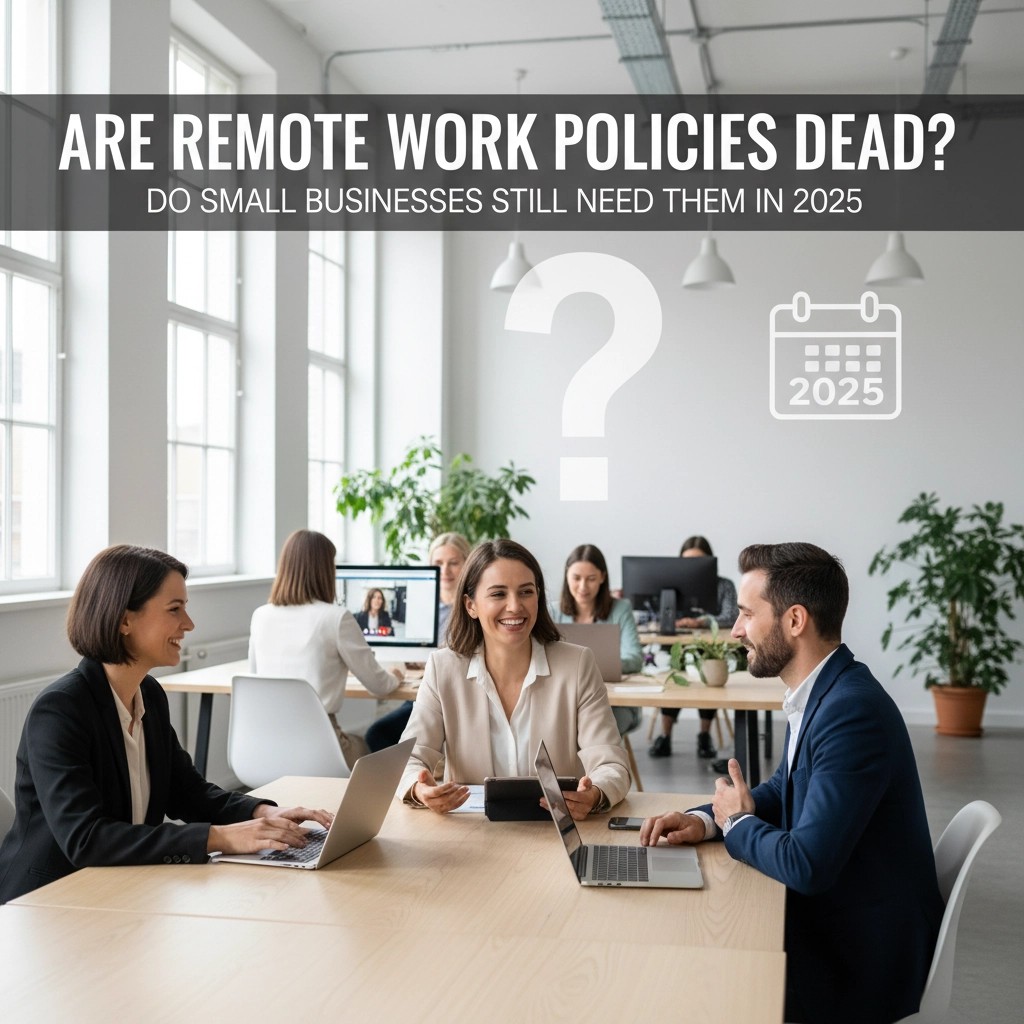Blogs
Are Remote Work Policies Dead? Do Small Businesses Still Need Them in 2025?
Are Remote Work Policies Dead? Do Small Businesses Still Need Them in 2025?

Let's address the elephant in the room: despite headlines about major corporations calling employees back to the office, remote work policies are far from dead. In fact, they're more essential than ever for small businesses looking to compete in today's talent market.
The share of U.S. employees working remotely has actually grown from 17.9% in late 2022 to 23.7% in early 2025. More telling? While remote and hybrid jobs represent just 20% of LinkedIn listings, they generate 60% of all applications. Your future employees are clearly telling you what they want.
The Evolution, Not Death, of Remote Work
Remote work isn't disappearing: it's evolving into something more sophisticated and sustainable. The all-or-nothing approach of 2020 has matured into strategic hybrid models that balance flexibility with collaboration needs.
As of February 2025, 52% of U.S. employees whose jobs can be done remotely work in a hybrid environment, with another 27% working fully remote. This means 79% of eligible employees spend at least some time working remotely. For small businesses, ignoring this reality means missing out on the vast majority of available talent.

Why Hybrid Is Winning
Hybrid work has emerged as the sweet spot because it addresses the challenges that pure remote work sometimes creates: like team cohesion and spontaneous collaboration: while preserving the benefits that made remote work attractive in the first place.
The most successful small businesses we work with have discovered that hybrid policies allow them to:
- Maintain team culture through regular in-person interactions
- Provide flexibility that attracts top talent
- Reduce overhead costs without sacrificing productivity
- Adapt quickly to changing business needs
The Small Business Advantage
Small businesses actually have a unique opportunity with remote work policies. Unlike large corporations that may struggle with complex logistics, small businesses can pivot quickly and create more personalized, effective remote work strategies.
Cost Reduction That Matters
For small businesses operating on tight margins, the cost savings from remote work can be game-changing. We're talking about:
- Reduced office space: Cut rent, utilities, and maintenance costs by 30-60%
- Lower equipment expenses: Employees often prefer using their own devices
- Decreased supply costs: Less office supplies, coffee, and miscellaneous expenses
- Reduced commute reimbursements: Many companies save on parking and transportation allowances
These savings allow you to reinvest in critical areas like marketing, product development, or employee benefits that actually matter to your team.

Access to Global Talent
Perhaps the most strategic advantage is talent access. Small businesses in smaller cities or specialized industries often struggle to find qualified candidates locally. Remote work policies eliminate geographic constraints entirely.
We've seen small businesses hire:
- Software developers from Eastern Europe at competitive rates
- Marketing specialists from major metropolitan areas
- Customer service representatives from regions with lower cost of living
- Specialized consultants who prefer flexible arrangements
This expanded talent pool leads to more diverse teams, fresh perspectives, and skills that might not be available in your immediate area.
The Performance Data Speaks
The evidence supporting remote work effectiveness continues to grow. A comprehensive analysis of 1.3 million employees found that cooperation, not physical proximity, drives productivity. Employees who feel they can count on others to cooperate are 8.2 times more likely to give extra effort.
Even more compelling: 97% of companies on the 2025 Fortune 100 Best Companies to Work For support remote or hybrid work, and these companies show productivity that is nearly 42% higher compared to typical U.S. workplaces.
What This Means for Your Business
These statistics aren't just numbers: they represent real competitive advantages. Small businesses with effective remote work policies consistently report:
- Higher employee satisfaction and retention rates
- Increased productivity during peak work hours
- Better work-life balance leading to reduced burnout
- Faster hiring processes due to expanded candidate pools
Technology Is Making It Easier
The integration of AI and automation tools in 2025 has solved many of the friction points that made remote work challenging in previous years. Today's small businesses have access to:
- Real-time collaboration tools that rival in-person meetings
- AI-powered scheduling assistants that coordinate across time zones
- Automated reporting systems that keep everyone aligned
- Virtual team-building platforms that maintain company culture

These tools level the playing field, allowing small businesses to operate with the efficiency of much larger organizations while maintaining personal connections with team members.
What Happens Without a Remote Work Policy?
Let's be clear about the consequences of ignoring remote work in 2025:
- Talent shortage: You'll compete for a smaller pool of local candidates
- Higher turnover: Employees will leave for companies offering flexibility
- Increased costs: Office overhead continues to climb while productivity stagnates
- Competitive disadvantage: More agile competitors will outpace you in hiring and innovation
- Employee dissatisfaction: Team members will feel restricted and undervalued
Building Your Remote Work Strategy
The question isn't whether to implement remote work policies: it's how to do it effectively. Here's what successful small businesses are doing:
Start with Clear Expectations
Define what remote work looks like in your organization:
- Which roles are eligible for remote work?
- What are the core collaboration hours?
- How will you measure productivity and success?
- What technology and equipment will you provide?
Focus on Outcomes, Not Hours
Shift from monitoring time to measuring results. Set clear goals and deadlines, then trust your team to deliver. This approach consistently produces better results than micromanagement.
Invest in the Right Tools
Don't let technology be a barrier. Budget for:
- Video conferencing platforms
- Project management software
- Cloud-based file sharing
- Communication tools for quick updates

Maintain Company Culture
Remote work requires intentional culture building:
- Schedule regular team check-ins
- Create virtual social interactions
- Celebrate achievements publicly
- Maintain open communication channels
The Compliance Component
Remember that remote work policies also need to address legal and HR compliance issues:
- Wage and hour laws across different states or countries
- Workers' compensation for home office injuries
- Data security and confidentiality requirements
- Tax implications for multi-state employees
Getting these details right from the start prevents costly mistakes down the road.
Your Next Steps
Remote work policies aren't just surviving in 2025: they're thriving as essential tools for small business success. The companies that embrace this reality and implement thoughtful, strategic remote work policies will have significant advantages in talent acquisition, cost management, and overall competitiveness.
The key is getting it right from the beginning. A well-designed remote work policy becomes a competitive advantage. A poorly implemented one becomes a liability.
Don't let the complexity stop you from capturing these benefits. The right HR partner can help you navigate the legal requirements, design effective policies, and implement systems that work for your specific business needs.
Ready to develop a remote work strategy that actually works for your small business? Let's build a policy framework that attracts top talent while protecting your company interests.
Schedule your complimentary consultation today, and let's create a remote work policy that drives your business forward.
We're in your corner,
Dr. Steve Cohen
HR Solutions On-Call
816.600.4215












